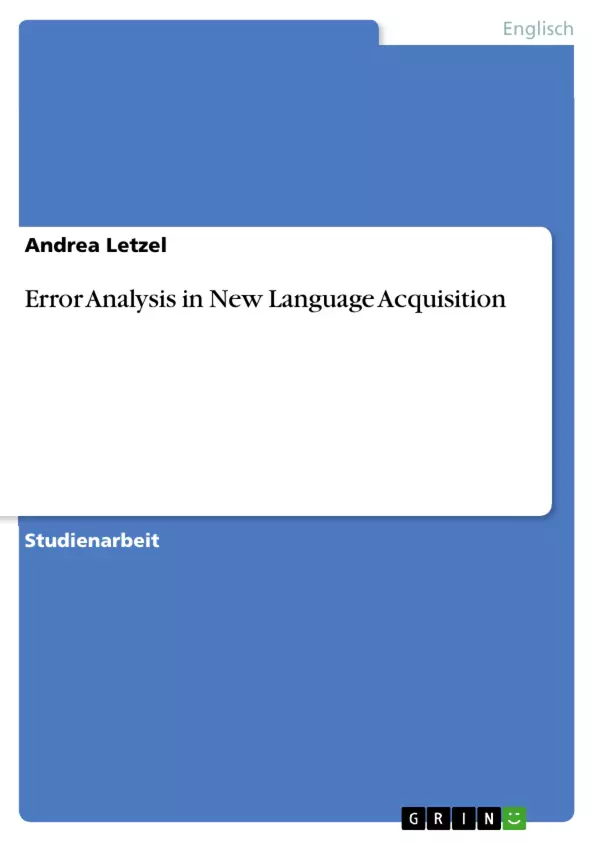Error Analysis, used in second language analysis, studies the errors learners make in speech and writing. It also studies the different types of errors and why they were made. In this term paper two different types of learners will be considered who perform spontaneously with the help of a picture story. There will be a special focus on the differences and similarities of their errors. There are various possibilities how samples of learner language can be influenced:
Firstly, the learner and his proficiency level have to be described and it is important if he speaks or learns other languages irrespective of the MT and the target language that is considered in the analysis. The way of instruction plays also an important role because instructed language learning provides a different error background as if the learner tries to learn the language naturalistically.
The second part that has to be described is the language itself. The medium can either be oral or written. Generally, the oral production consist of a more colloquial English for the simple reason that the learner has not as much time to think about formulation than in written speech. Therefore, the Genre and the content of the language production is Error Evaluation and Error correction are additional parts that have not to be included in every Error Analysis.
According to the dictionary of Linguistics the error analysis is subdivided and classified in modality, levels of linguistic description, form, type and cause.
Inhaltsverzeichnis
- Introduction
- Error Analysis
- Sample of Learner Language
- Method and Data
- Learner Background
- Description of the First Learner
- Description of the Second Learner
- Description of Errors
- First Learner
- First Performance
- Performance with preparation time
- Second Learner
- First Performance
- Second Performance
- First Learner
- Error Frequency Analysis
- Effects of Preparation Time and Breaks
- Similarities and Differences
- Conclusion
Zielsetzung und Themenschwerpunkte
Diese Arbeit befasst sich mit einer Fehleranalyse von mündlichen Präsentationen, die von zwei Lernenden des Englischen als Zweitsprache gehalten wurden. Die Arbeit untersucht, welche Fehler die Lernenden machen, wie sich die Fehlertypen unterscheiden und wie sich die Fehlerhäufigkeit durch Vorbereitungszeit und Pausen beeinflusst.
- Identifizierung und Beschreibung von Fehlern in mündlichen Präsentationen
- Analyse der Fehlertypen in Bezug auf die sprachlichen Kategorien
- Untersuchung der Auswirkungen von Vorbereitungszeit auf die Fehlerhäufigkeit
- Vergleich der Fehlermuster bei Lernenden mit unterschiedlichen Englischkenntnissen
- Beurteilung der Rolle von Pausen während der Präsentationen
Zusammenfassung der Kapitel
- Introduction: Die Einleitung stellt die Bedeutung der Fehleranalyse für das Verständnis des Zweitspracherwerbs dar und erläutert den Forschungsansatz der Arbeit.
- Error Analysis: Dieses Kapitel definiert den Begriff "Fehler" und erläutert die verschiedenen Schritte der Fehleranalyse, wobei der Fokus auf die Identifizierung, Beschreibung und Interpretation von Fehlern liegt.
- Sample of Learner Language: Dieses Kapitel beschreibt die Methode der Datenerhebung und die Auswahl der Lernenden. Es gibt einen Überblick über die Lernenden und ihre sprachlichen Voraussetzungen.
- Description of Errors: Dieses Kapitel beschreibt die beobachteten Fehler in den mündlichen Präsentationen der Lernenden, wobei die Fehler nach Kategorien geordnet und die Ursachen analysiert werden.
- Error Frequency Analysis: Dieses Kapitel untersucht die Häufigkeit der Fehler und analysiert den Einfluss von Vorbereitungszeit und Pausen auf die Fehlerhäufigkeit.
Schlüsselwörter
Fehleranalyse, Zweitspracherwerb, mündliche Präsentation, Fehlertypen, Fehlerhäufigkeit, Vorbereitungszeit, Pausen, Lernende, Englisch als Zweitsprache.
Häufig gestellte Fragen
Was ist das Ziel einer Fehleranalyse (Error Analysis)?
Sie untersucht die Fehler, die Lernende beim Sprechen und Schreiben machen, klassifiziert diese und erforscht die Ursachen für deren Entstehung.
Wie wurde die Sprachprobe in dieser Arbeit erhoben?
Zwei Lernende des Englischen hielten spontane mündliche Präsentationen basierend auf einer Bildergeschichte.
Welchen Einfluss hat Vorbereitungszeit auf die Fehlerhäufigkeit?
Die Arbeit untersucht, wie sich Fehlermuster verändern, wenn die Lernenden Zeit zur Vorbereitung haben oder Pausen während der Präsentation machen.
Was unterscheidet mündliche von schriftlichen Fehlern?
Mündliche Produktionen sind oft umgangssprachlicher, da der Lernende weniger Zeit zum Nachdenken über die Formulierung hat als beim Schreiben.
Welche Rolle spielt der Hintergrund der Lernenden?
Das Sprachniveau, bereits gelernte andere Sprachen sowie die Art des Unterrichts (gesteuert vs. natürlich) beeinflussen das Fehlerprofil maßgeblich.
Nach welchen Kriterien werden Fehler klassifiziert?
Fehler werden nach Modalität, linguistischer Beschreibungsebene, Form, Typ und Ursache unterteilt.
- Quote paper
- Andrea Letzel (Author), 2010, Error Analysis in New Language Acquisition, Munich, GRIN Verlag, https://www.grin.com/document/344447



